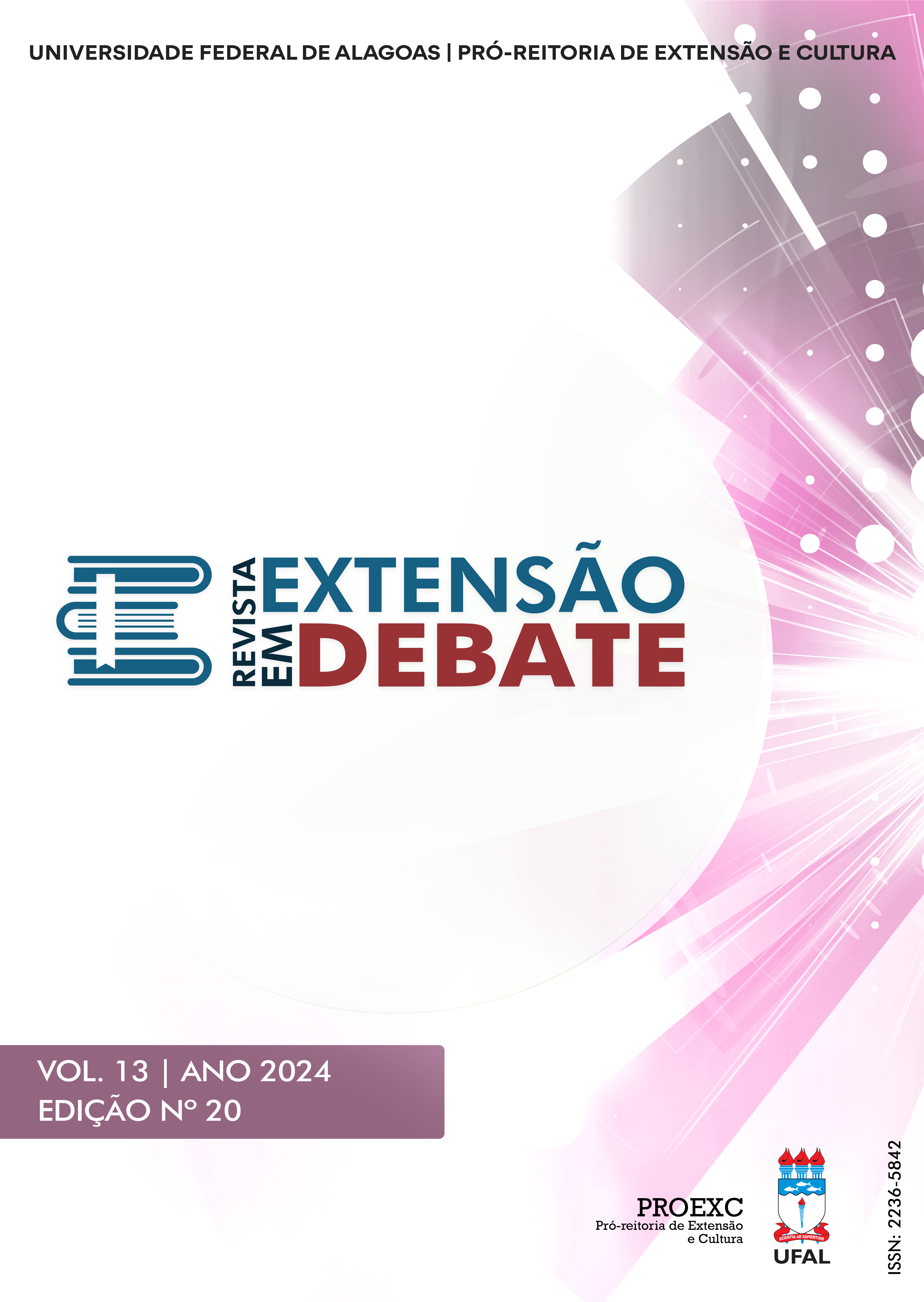ENGLISH LANGUAGE TEACHING CONNECTING THE BACHELOR'S PROGRAM TO THE COMMUNITY THROUGH CURRICULUM-INTEGRATED EXTENSION
ENGLISH LANGUAGE TEACHING CONNECTING THE BACHELOR'S PROGRAM TO THE COMMUNITY THROUGH CURRICULUM-INTEGRATED EXTENSION
Keywords:
Metodologias de ensino. Ensino de língua inglesa. Laboratório de ensino. Micropráticas de ensino. Extensão curricularizada.Abstract
This article presents the impacts of a curriculum-integrated extension project linked to the course Methodology and Laboratory for Teaching English in the fourth semester of the Bachelor's Degree in Languages – Portuguese/English at the Osório campus of IFRS. Considering that most pre-service teachers lack prior teaching experience, the project's goal was to provide practical teaching experiences to student teachers and offer new language learning opportunities to students at a local public school through a partnership between the school and educators. This collaboration was established between the teacher educator and two English language teachers. The student teachers developed English teaching activities and delivered them to the partner school's classes in what was termed a "micro-teaching practice."The results, based on the analysis of the planning and execution of these practices, along with seminars throughout the course, suggest that the curriculum-integrated extension activities served as a catalyst, enhancing the development of future teachers' professional identity (Bronckart, 2006). The findings indicate that practical experience plays a crucial role in shaping future educators. It was observed that the more practical experiences are offered, the better the construction of the professional identity of future teachers. Furthermore, integrating experiential knowledge with the knowledge of professional training (Tardif, 2002) enables student teachers to establish an essential link between theory and practice. In summary, curriculum-integrated extension reinforces the social role of (trans)forming new teachers capable of reconfiguring their teaching practices.
Downloads
References
BRASIL. Lei de Diretrizes e Bases da Educação Nacional, LDB. 9394/1996.
BRASIL. Ministério da Educação. Base Nacional Comum Curricular. Brasília, 2018.
BRASIL. Ministério da Educação. Conselho Nacional de Educação. Resolução nº 7, de 18 de dezembro de 2018.
BRASIL. Parâmetros Curriculares Nacionais. Ministério da Educação e do Desporto: Secretaria de Educação Fundamental. Brasília, 1997.
BRONCKART, J.P. Atividade de linguagem, discurso e desenvolvimento humano. Campinas: Mercado de Letras, 2006.
BROWN, H. Douglas. ABEYWICKRAMA, Priyanvada. Language Assessment. Principles and Classroom Practices. 2nd ed White Plains, NY: Pearson Longman, 2010.
DI PIETRO, J-F. de. SCHNEUWLY, B. O modelo didático de gênero: um conceito de engenharia didática. MOARA: Revista da pós-graduação em Letras da UFPA. Belém: CLA/UFPA, nº25, p. 15-52. Jan/jun, 2009.
HALL, Joan K. Methods for Teaching Foreign Languages: Creating a Community of Learners in the Classroom. Prentice Hall, 2001.
HARMER, J. How to Teach English. England: Longman, 2007.
LOUSADA, E.G. et al. O trabalho do professor: revelações possíveis pela análise do agir representado nos textos. IN: GUIMARÃES, A.M.M., MACHADO, A.R. e COUTINHO, A. (Orgs.). O Interacionismo Sociodiscursivo. Questões epistemológicas e metodológicas. Campinas: Mercado de Letras, 2007.
MACHADO, A.R. Por uma concepção ampliada do trabalho do professor. IN: GUIMARÃES, A.M.M., MACHADO, A.R. e COUTINHO, A. (Orgs.). O Interacionismo Sociodiscursivo. Questões epistemológicas e metodológicas. Campinas: Mercado de Letras, 2007.
PAIVA, V.L.M.O. Ensino de Língua Inglesa no Ensino Médio: teoria e prática. São Paulo: SM, 2012.
PIMENTA, S.G. LIB NEO, J.C. Formação dos profissionais da educação: visão crítica e perspectivas de mudança. Educação & Sociedade, Campinas: Cedes, nº 68, p.239-277, 1999.
SCHNEUWLY, Bernard. DOLZ, Joaquim. Gêneros Orais e Escritos na Escola. Campinas: Mercado de Letras, 2004.
SWAN, Michael. Seven bad reasons for teaching grammar – and two good ones. IN: RICHARDS, J. RENANDYA, W. Methodology in language teaching. Cambridge: CUP, 2002.
TARDIF, M. Os saberes dos professores. Congresso realizado na UNISINOS, Universidade do Vale do Rio do Sinos, Rio Grande do Sul: 2012.(mimeo).5p.
TARDIF, M. Saberes docentes e formação profissional. Petrópolis: Vozes, 2002.
UR, Penny. A Course in Language Teaching. Cambridge: CUP, 2010.
WENGER, E. et al. Cultivating Communities of Practice. Boston, MA: Harvard Business School Press, 2002.
Published
How to Cite
Issue
Section
License
Copyright (c) 2024 REVISTA ELETRÔNICA EXTENSÃO EM DEBATE

This work is licensed under a Creative Commons Attribution-NonCommercial-ShareAlike 4.0 International License.

